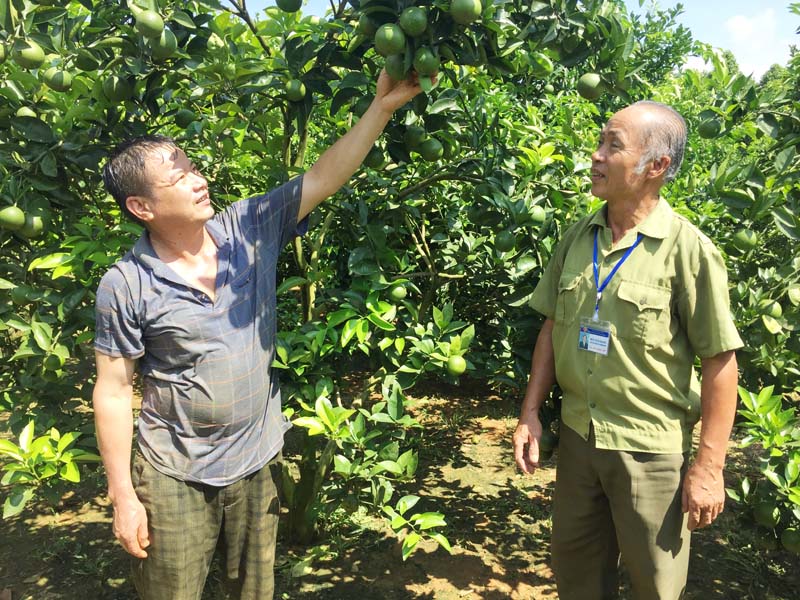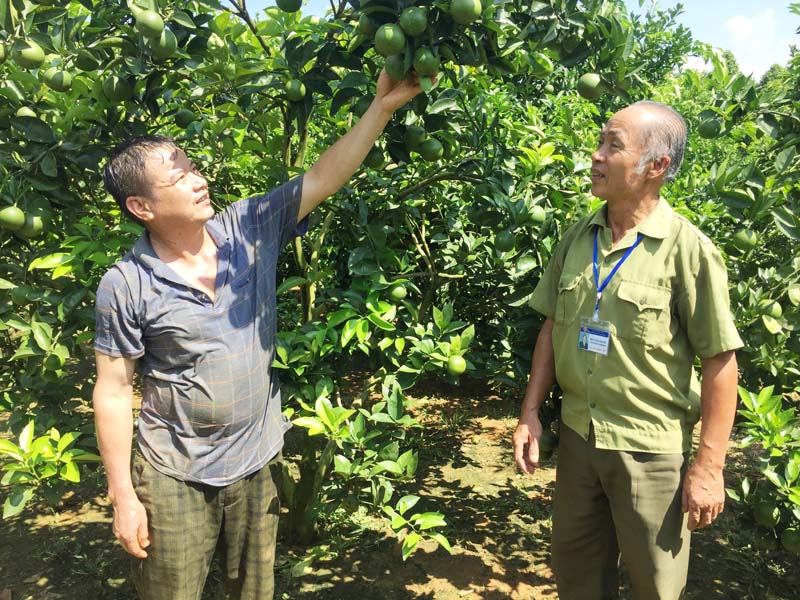
(HBO) - Prior to 2013, citrus growing is quite strange to veteran members of An Nghia Commune (Lac Son). However, up to now, citrus planting area has been expanded to nearly 20 hectares owned by veteran members. Thanks to the effectiveness of the model, the average income of veteran members reaches at 23.5 million VND / person / year, the rate of poor households reduced to 3%.

exchanging, sharing experience and techniques
of citrus planting…
Visiting Mr. Bui Van Dung's family in Vo
village, the veteran members pioneered to plant citrus trees in An Nghia
commune since 2014. At present, the area of citrus trees of Mr. Dung's family
has extended to 2 hectares, of which includes 850 original orange trees with
variety, such as: yellow, V2, Canh and 150 green grapefruit trees. In 2017, the
oranges were harvested for fortune tellers; Mr. Dung exported 20 tonnes of
fruit. The market price ranged from 13,000 to 20,000 VND depending on the types
of fruit. Thereby, his family earned over 300 million VND. Traders buying
products are mainly from provinces of Thanh Hoa, Ninh Binh, Nam Dinh, etc. In
the season of 2018, the orange garden of Mr. Dung will give the main crop; the
output is expected to be 2-3 times higher.
Currently, in order to support and assist
members who wish to develop the citrus planting model, the Veteran Association
of the commune have coordinated with other departments, organizations and mass
organizations to organize thematic workshops. This helps create a useful
playground for members to exchange information and share their citrus planting
experiences. In addition, the Veteran Association of the commune has
facilitated 10 members to access the capital from the District Social Policy
Bank with the loan amount as regulated.
Mr. Bui Van Dang, the Chairman of the Veteran
Association of the commune, said: "In the coming time, the Veteran
Association of the commune continues to propagate and mobilize officials and
members to bring into full play the effectiveness of the citrus planting
model.we expect that all the branches, organizations, unions to support capital
sources, science and technology, we are also looking for business associates to
link for product consumption. Thereby, this can contribute to increasing the
income for members, reducing the rate of poor households, promoting the local
socio-economic development.
According to data from the Hoa Binh Provincial Party Committee, the industrial production index for the first six months of 2025 is estimated to have increased by 20% compared to the same period last year. This marks the highest year-on-year growth rate for this period since 2020.
In the first six months of 2025, Hoa Binh province’s export turnover was estimated at 1.145 billion USD, marking an 18.11% increase compared to the same period in 2024. Import turnover was estimated at $ 804 million, a 17.15% increase, which helped the province maintain a positive trade balance.
The lives of the ethnic minority farmers in Tan Lac district have gradually improved thanks to the new directions in agricultural production. This is a testament to the collective strength fostered through the professional associations and groups implemented by various levels of the district’s Farmers’ Union.
With the motto the "product quality comes first,” after nearly one year of establishment and operation, Muong village’s Clean Food Agricultural and Commercial Cooperative, located in Cau Hamlet, Hung Son Commune (Kim Boi district), has launched reputable, high-quality agricultural products to the market that are well-received by consumers. The products such as Muong village’s pork sausage, salt-cured chicken, and salt-cured pork hocks have gradually carved out a place in the market and they are on the path to obtaining the OCOP certification.
In the past, the phrase "bumper harvest, rock-bottom prices" was a familiar refrain for Vietnamese farmers engaged in fragmented, small-scale agriculture. But today, a new spirit is emerging across rural areas of Hoa Binh province - one of collaboration, organisation, and collective economic models that provide a stable foundation for production.
Maintaining growing area codes and packing facility codes in accordance with regulations is a mandatory requirement for agricultural products to be eligible for export. Recently, the Department of Agriculture and Environment of Hoa Binh province has intensified technical supervision of designated farming areas and packing facilities to safeguard the "green passport" that enables its products to access international markets.



